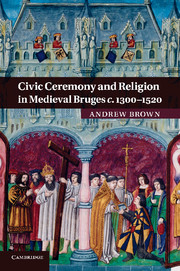Book contents
- Frontmatter
- Contents
- List of figures
- List of maps
- Acknowledgments
- List of abbreviations
- Note on currency and monies of account
- Introduction
- 1 The Holy Blood procession
- 2 General processions
- 3 Feast days and liturgical commemoration
- 4 Guilds: feast, festivity and public worship
- 5 Guilds and civic government
- 6 Civic charity
- 7 Civic ceremony, religion and the counts of Flanders
- Conclusion and epilogue: civic morality c. 1500
- Appendices
- Bibliography
- Index
7 - Civic ceremony, religion and the counts of Flanders
Published online by Cambridge University Press: 03 May 2011
- Frontmatter
- Contents
- List of figures
- List of maps
- Acknowledgments
- List of abbreviations
- Note on currency and monies of account
- Introduction
- 1 The Holy Blood procession
- 2 General processions
- 3 Feast days and liturgical commemoration
- 4 Guilds: feast, festivity and public worship
- 5 Guilds and civic government
- 6 Civic charity
- 7 Civic ceremony, religion and the counts of Flanders
- Conclusion and epilogue: civic morality c. 1500
- Appendices
- Bibliography
- Index
Summary
In May 1468, Charles the Bold came to Bruges to hold his first chapter as sovereign lord of the Burgundian Order of the Golden Fleece. The occasion combined magnificence with solemnity. In tones of some awe, de Roovere records the precise order of knights and heralds as they rode on horseback to Our Lady's church for vespers on 8 May to attend the vigils of one of their own, the count of Nivers. A shield was later hung in the choir in memory of the deceased knight. Sixteen days later, the knights attended mass at St Donatian's for the soul of another member of the Order, Jacques de Bourbon. Charles himself processed closest to the body. The chronicler takes note of the costly splendour of the occasion. He also records that townsmen were involved: behind the funeral cortège came town councillors, with burning torches carried before them.
The chronicler's description of the Golden Fleece event conjures a familiar image of Burgundian magnificence. As to the effects of princely ceremony on the town, it permits an equally familiar interpretation: of a court festivity imposing itself on civic landscape and memory, displaying its exclusive and exemplary hierarchy, reducing citizens to the role of passive observers who trail in the wake of the courtly cortège. Burgundian court spectacle was indeed increasingly played out in the towns of Flanders and Brabant, particularly from 1430 onwards; Bruges citizens had become well acquainted with spectacles like the Golden Fleece meetings, which they had first hosted in 1432.
- Type
- Chapter
- Information
- Civic Ceremony and Religion in Medieval Bruges c.1300–1520 , pp. 222 - 279Publisher: Cambridge University PressPrint publication year: 2011



